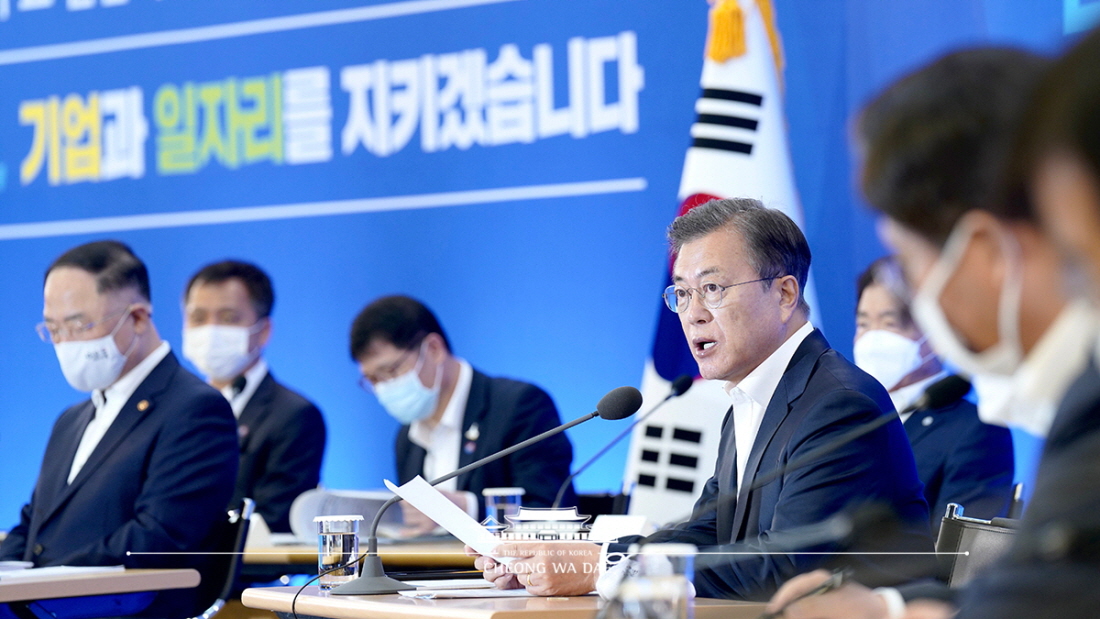이 웹사이트는 제19대 대통령 임기 종료에 따라 대통령기록관이 「대통령기록물 관리에 관한 법률」에 의해 이관받아 서비스하는 대통령기록물입니다. 자료의 열람만 가능하며 수정 · 추가 · 삭제는 불가능합니다.
다만, 「개인정보보호법」에 의하여 개인의 정보를 보호받기 원하시는 분은 관련 내용(요청자, 요청내용, 연락처, 글위치)을 대통령 웹기록물 담당자(044-211-2253)에게 요청해 주시면 신속히 검토하여 조치해 드리겠습니다. 감사합니다.
SPEECHES & REMARKS
BRIEFINGS
Remarks by President Moon Jae-in at Meeting with Business Leaders from Key Industries

I am glad to meet you all. As everyone knows, our industries and jobs are all in a crisis situation. The slowdown of the real economy and employment crisis are spilling over to the manufacturing industry, going beyond service industries. Today, we have brought together representatives from business associations and business leaders from nine key industries – airlines, shipping, machinery, automobiles, shipbuilding, oil refining, petrochemicals, steel and textiles – to discuss how to overcome these crises. I hope that this meeting will serve as an opportunity for the private and public sectors to come together to surmount the crises and create a platform for growth, thus bringing hope to the people.
Recently, the airline and shipping industries have been directly hit by global border closures and restrictions on movements, and shipbuilding orders have also plunged. In addition, the automobile industry is in a very difficult situation because of decreased market demand in North America and Europe as well as disruptions in overseas production. Work orders for the textile industry have also sharply declined since more than 80 percent of fashion companies in the United States and Europe have gone out of businesses.
The downturn of the automobile and shipbuilding industries has led to hardships in such downstream industries as machinery, petrochemicals, steel and oil refining, and export markets are not in a normal state either. Large businesses’ production setbacks and the drop in received orders have scaled back work orders for small and mid-size suppliers, and the damage is even worse for second- and third-tier suppliers.
Cooperation – not only between the Government and business community but between different industries, large businesses and SMEs and labor and management – is desperately needed. With an exceptional resolve to safeguard the “industrial ecosystem” in its entirety, we must protect jobs as well as revive our industries and economy without fail.
Through five rounds of Emergency Economic Council meetings, the Government made the extraordinary decision to inject 245 trillion won – 13 percent of our country’s GDP – into overcoming this economic crisis, and it is also preparing a third supplementary budget. In particular, the Government raised a key industry stabilization fund worth 40 trillion won as a move to swiftly provide assistance for the airline, shipping and other key industries which are facing difficulties. It is also providing support to SMEs and microbusiness owners through a 140-trillion-won package program to stabilize people’s livelihoods and finances.
In addition, in order to promote employment security, requirements related to subsidies for retaining jobs and providing unpaid leave have been eased, and the scope of businesses eligible for special employment support has been expanded. Through the 10-trillion-won job security package, we will provide employment support for the vulnerable and young people. Among other things, the Government will quickly implement the Korean version of the New Deal. We’ll put all our efforts into recovering the economy, securing future competitiveness, protecting jobs and expanding the employment safety net.
The digital economy age, which has been accelerated due to COVID-19, requires bolder and faster changes. The airline and shipping industries are utilizing data to enhance competitiveness in their passenger and logistics services. Textile factories, steel mills and shipyards are using big data and artificial intelligence technologies to manage production processes and quality.
Oil refineries are working on electric car charging and payment data systems while petrochemical producers have embarked on developing advanced materials. The machinery and automobile industries are responding swiftly to the development of unmanned automation at construction sites and the mobility service market, respectively.
For its part, the Government will strive to nurture future technology professionals while supporting Korean companies’ efforts to innovate. We are expediting the training of experts in such new industrial areas as artificial intelligence, big data, blockchain technology, future cars, drones, intelligent robots, smart ships and biomedicine. We will provide support for joint research with world-class universities, research institutions and companies in order to increase R&D capabilities. When more chances are given to young adults who try to turn changes into opportunities and take on new challenges, the competitiveness of companies and the country will rise. I hope that more of the talented individuals needed for businesses are nurtured so that the key capabilities of the digital economy will be strengthened.
We have built a new future while overcoming crises. During the 1997 foreign exchange crisis, we cultivated our IT industry, and we fostered the green industry during the global economic crisis. I am confident that if businesses, the Government and the people all join forces, we will be able to surmount the industrial crisis caused by COVID-19 and be reborn as a powerhouse in an era of the digital economy.
I ask you to have a strong resolve to be the first to overcome the crises linked to infectious disease prevention and control and the economy and take the lead in the post-COVID-19 era.
Thank you.



